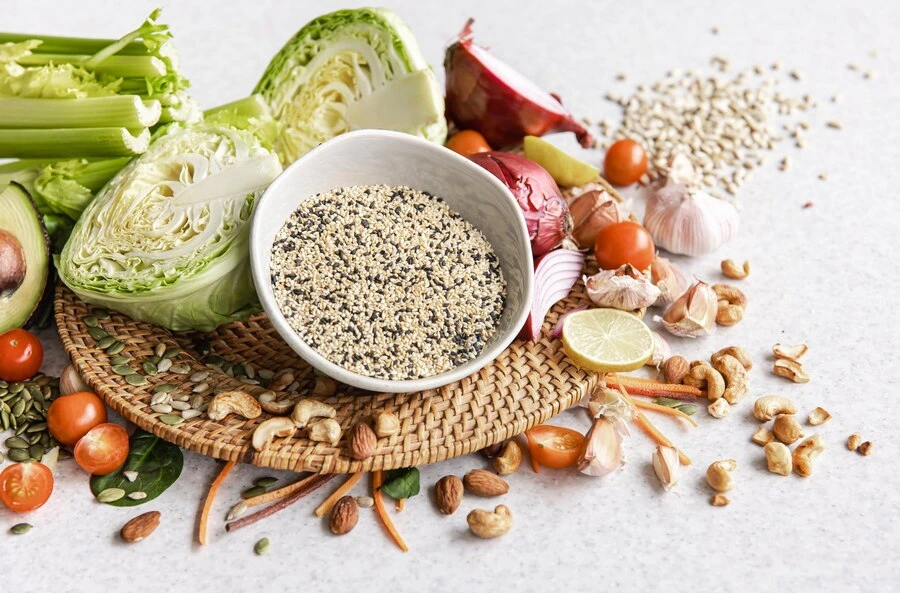
Superfoods Essentials: Achieve a Balanced Diet
Superfoods For Balanced Nutrition: Did you know that incorporating the right superfoods into your diet can have a significant impact on your overall health?
A balanced diet that includes nutrient-rich foods can provide numerous benefits, from supporting heart health to improving brain function and even preventing cancer.
Discover the top superfoods that can help you achieve optimal wellness and enjoy a healthier lifestyle.
Click Here To Learn More
Key Takeaways:
- Incorporate nutrient-rich superfoods into your diet to achieve a balanced eating plan.
- Superfoods like watercress, flaxseed, eggs, oats, yogurt, kale, beans, chia seeds, and walnuts offer various health benefits.
- These superfoods provide antioxidants, essential vitamins and minerals, fiber, plant-based protein, and omega-3 fatty acids.
- Including these superfoods in your meals can support heart health, brain function, and aid in weight management.
- Whether you’re looking for organic options, superfoods for weight loss, or clean eating choices, these nutrient powerhouses can help you achieve your goals.
Watercress: A Nutrient Powerhouse
When it comes to superfoods, watercress undoubtedly deserves a place on your plate.
This leafy green is not only incredibly delicious but also packed with a wide range of health benefits.
Renowned for its nutrient powerhouse status, watercress is an excellent addition to any balanced diet.
Rich in antioxidants and nutrients like vitamin K, watercress offers a unique mix of health-boosting properties.
Its high concentration of antioxidants helps fight oxidative stress and supports overall well-being.
Additionally, vitamin K plays a crucial role in promoting bone health and blood clotting.
One of the key highlights of watercress is its potential anti-cancer properties. Studies have shown that watercress contains phenylethyl isothiocyanate (PEITC), a compound that exhibits anti-cancer activity.
Incorporating watercress into your meals can be a simple way to add a natural defense against cancer cells.
If you’re looking to boost the nutritional value of your dishes, watercress is a fantastic choice.
Its versatile nature allows for easy integration into salads, sandwiches, or smoothies.
The crisp and peppery flavor of watercress adds a refreshing twist to any dish, making it an excellent addition to your culinary repertoire.
Putting the Nutritional Facts on the Table
Curious about the specific nutrients packed within watercress? Take a look at this table to get a clear overview:
| Nutrient | Amount per 100g |
|---|---|
| Calories | 11 |
| Protein | 2.3g |
| Carbohydrates | 1.9g |
| Fiber | 0.5g |
| Fat | 0.1g |
| Vitamin C | 43mg |
| Calcium | 120mg |
| Vitamin K | 250mcg |
As you can see, watercress is low in calories and fat while packing a punch in terms of vitamins and minerals.
Having watercress in your repertoire can contribute significantly to a well-rounded diet.
“Watercress is a true nutrient powerhouse that offers an array of health benefits. Its high content of antioxidants and key nutrients like vitamin K makes it an excellent choice for supporting overall well-being and potentially even combating cancer.”
Incorporating watercress into your meals is a simple yet impactful way to enhance your diet’s nutritional value.
Whether you’re blending it into a vibrant green smoothie or enjoying its crispness in a salad, watercress adds a burst of freshness and a wealth of health benefits.
Flaxseed: High in Fiber and Omega-3 Fatty Acids
Flaxseed, or flaxmeal, is high in fiber, which is important for gut health and regularity. It’s also a great source of omega-3 fatty acids, healthy fats that can lower cholesterol and blood pressure.
Ground flaxseed can be added to cereal, smoothies, or used as an egg substitute in baking.
Flaxseed is a versatile and nutritious addition to any diet.
It is derived from the flax plant (Linum usitatissimum) and has been consumed for thousands of years for its numerous health benefits.
One of the key advantages of flaxseed is its high fiber content.
With around 3 grams of fiber per tablespoon, flaxseed can contribute to improved digestion and help maintain healthy cholesterol levels.
Besides its high fiber content, flaxseed is also rich in omega-3 fatty acids.
These fatty acids, predominantly in the form of alpha-linolenic acid (ALA), are essential for optimal health.
Omega-3 fatty acids have been associated with a range of health benefits, including reducing inflammation, improving heart health, and supporting brain function.
Adding flaxseed to your diet is easy. Ground flaxseed, or flaxmeal, can be sprinkled on top of cereal, yogurt, or added to smoothies for an extra nutritional boost.
It can also be used as a replacement for eggs in baking recipes, making it a great option for those with dietary restrictions or allergies.
Flaxseed is a powerhouse ingredient that offers a variety of health benefits. Its high fiber and omega-3 fatty acid content make it a valuable addition to any balanced diet.
Include flaxseed in your meals to experience its healthful properties. Your gut and heart will thank you.
Quote: “Flaxseed is a versatile ingredient that adds a nutritional punch to your meals while promoting good digestive health and heart function.”
Eggs: An All-Around Nutrient Powerhouse
Eggs are often recognized as a breakfast staple, but their nutritional benefits extend far beyond their delicious taste.
They are a true nutrient powerhouse, providing high-quality protein, essential vitamins, and minerals that support overall health and well-being.
One of the main reasons eggs are considered a nutritional powerhouse is their high-quality protein content.
Protein is crucial for building and repairing tissues, supporting muscle growth, and maintaining a healthy metabolism.
In fact, eggs are a complete source of protein, containing all nine essential amino acids that the body needs.
In addition to protein, eggs are rich in essential vitamins and minerals.
They are an excellent source of vitamin B12, which is important for brain function and the production of red blood cells.
Eggs also provide vitamin D, which is needed for strong bones and teeth, as well as essential minerals like iron and zinc.
Contrary to previous beliefs, it is now recommended to consume the yolk along with the egg white.
The yolk of an egg is where most of the nutrients are concentrated.
It contains important nutrients like choline, which plays a crucial role in brain health and development.
Choline is especially important during pregnancy, as it supports the healthy growth of the baby’s brain and prevents certain birth defects.
To incorporate eggs into your diet, you can enjoy them boiled, scrambled, or poached.
They can be added to salads, sandwiches, or used as a versatile ingredient in various recipes.
Eggs are not only a delicious and versatile food but also a rich source of high-quality protein, essential vitamins, and minerals. Including eggs in your diet can help you meet your nutritional needs and support overall health.
| Nutrient | Amount per 100g |
|---|---|
| Protein | 13g |
| Fat | 11g |
| Cholesterol | 373mg |
| Vitamin B12 | 0.89mcg |
| Vitamin D | 1.1mcg |
| Choline | 294mg |
Eating up to one whole egg per day is considered safe and part of a heart-healthy diet.
However, it is important to note that individuals with certain medical conditions or dietary restrictions should consult with a healthcare professional before making any changes to their diet.
Next, we’ll explore another superfood that is high in fiber and omega-3 fatty acids: flaxseed.
Conclusion
Incorporating top superfoods into your diet is a smart way to achieve a balanced and healthy eating plan.
These nutrient-rich foods offer a multitude of benefits that can support your overall well-being.
For those aiming to lose weight, superfoods can be a valuable addition to your diet.
Their high nutritional content and low-calorie density make them an excellent choice for weight loss.
Incorporating superfoods like watercress, flaxseed, and chia seeds can help you reach your weight loss goals effectively.
Organic superfoods are another great option for those looking to prioritize clean eating.
By choosing organic, you can limit your exposure to harmful pesticides and chemicals.
Superfoods like watercress, flaxseed, and kale are readily available in organic varieties, allowing you to nourish your body while supporting sustainable and environmentally friendly practices.
The benefits of superfoods extend beyond weight loss and clean eating.
These powerhouses of nutrition can support heart health, improve brain function, and even help in the prevention of certain diseases, including cancer.
By incorporating superfoods like eggs, oats, and walnuts into your meals, you can provide your body with essential nutrients and antioxidants that promote optimal wellness.
FAQ
What are some top superfoods for a balanced diet?
Some top superfoods for a balanced diet include watercress, flaxseed, eggs, oats, yogurt, kale, beans, chia seeds, and walnuts.
Why is watercress considered a nutrient powerhouse?
Watercress is considered a nutrient powerhouse because it is packed with antioxidants and nutrients like vitamin K. It also offers a unique mix of nutrients and plant compounds that may have anti-cancer properties.
What are the health benefits of flaxseed?
Flaxseed is high in fiber, which promotes gut health and regularity. It is also a great source of omega-3 fatty acids, which can lower cholesterol and blood pressure.
What makes eggs an all-around nutrient powerhouse?
Eggs are an all-around nutrient powerhouse because they provide high-quality protein and essential vitamins and minerals. Contrary to previous beliefs, eating the yolk is recommended as it contains important nutrients like choline, which supports brain health.
How can incorporating superfoods into my diet help achieve balance and promote healthy eating?
Incorporating superfoods into your diet can help you achieve a balanced and healthy eating plan. These nutrient-rich foods provide numerous health benefits, including supporting heart health, brain function, and cancer prevention. Whether you’re looking to lose weight, eat clean, or enjoy the benefits of organic superfoods, adding these superfoods to your meals can nourish your body and promote optimal wellness.
Related: Nourish Your Skin from Within: Supplement Secrets for a Healthy Skincare






